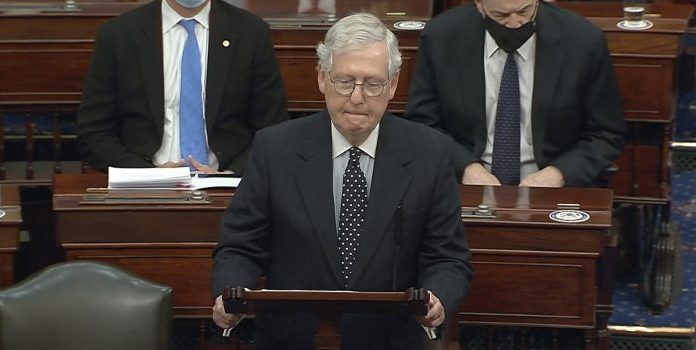Senate Minority Leader Mitch McConnell, R-Ky., had vowed to be “100% focused” on stopping President Joe Biden’s agenda.
But when it comes to the pending $1 trillion ‘bipartisan’ infrastructure plan, McConnell is sounding like a go.
Last week, the Kentucky senator allowed debate to proceed on the measure, which would boost spending on just about every facet of the country’s transportation systems as well as water and broadband.
This week, he said nice things about the legislation, opening the door to potentially giving his support for final passage.
“There’s an excellent chance it will be a success story for the country,” McConnell told reporters Tuesday.
Some colleagues say McConnell simply likes the bill and that his state would benefit from the federal investments.
Others say McConnell thinks the bill could help some of the Republicans in contested elections next year if they pass it and send government aid to their states.
Still others say McConnell is also thinking about a much bigger picture.
“He’s a very pragmatic person. I think he knows that everybody sort of wins if it’s true, hard infrastructure,” said Sen. Kevin Cramer, R-N.D.
“This is a good demonstration that he can preserve the filibuster and still have meaningful, bipartisan legislation,” Cramer said. “And at the end of the day, he’s got a constituency back in Kentucky that probably looks pretty favorably on it.”
Democrats see another dynamic at work.
Sen. Chris Van Hollen, D-Md., said Republicans are at risk of being seen as having little to show voters after having already opposed Biden’s $1.9 trillion COVID-19 rescue. Not a single Republican senator supported that plan.
“I think they want to be able to point to something positive that they’ve done,” Van Hollen said. “And, if they oppose everything, they are not going to be able to claim credit for anything.”
McConnell could still vote “no” on the public works plan. But so far, he has twice voted to advance the legislation. And while warning Senate Majority Leader Chuck Schumer, D-N.Y., against rushing the amendment process, he has not tried to halt the work.
McConnell has saved his scorn for the big vote that Schumer is preparing before the Senate breaks for an August recess.
Democrats are plotting to use the budget to slip in a far larger “human infrastructure” package creating new welfare entitlements by using the reconciliation process to avoid needing any GOP support.
McConnell has derided an upcoming budget blueprint featuring a $3.5 trillion spending package as a “reckless tax and spending spree.”
Republican strategist Scott Jennings, a longtime McConnell ally, said it’s easy to see how McConnell could get to “yes” on this first part of Biden’s infrastructure priorities.
“Just listen to what he said,” Jennings said. “He always said it should be a smaller package focused on roads bridges airports and broadband.”
Kentucky is not a state without needs, with its roads and bridges requiring investments, Jennings said.
Biden and former President Barack Obama both cited the Brent-Spence Bridge between Kentucky and Ohio when promoting plans to boost jobs.
Politically, the votes ahead could be a win-win for McConnell and Republicans to show some bipartisanship on this first package while launching into a strictly partisan broadside against the larger plan.
“I do think it gives Republicans senators a chance to say, ‘Look, they always claim we’re going to stop everything,’ ” Jennings said.
“It does give the Republicans a chance to say, `We’re for the stuff that makes sense and we’re against the stuff that doesn’t.’”
Sen. Rob Portman of Ohio, who led the Republican side in its negotiations on the infrastructure bill, pointed out that McConnell’s wife, former Transportation Secretary Elaine Chao, knows well the country’s infrastructure needs.
“He understands that the politics of this are also good for Republicans. And when our members are out there running for re-election, it’s good to be talking about accomplishments,” Portman said.
McConnell’s vote could make or break the package, serving up a victory for Biden with passage or delivering another failure by Washington to address the nation’s infrastructure needs. The Trump administration was unable to follow through on the president’s call for investing trillions of dollars in infrastructure.
One theory making the rounds on Capitol Hill is that passing the bipartisan package will put pressure to trim the size of the larger plan. Already, Sen. Kyrsten Sinema, D-Ariz., has said she does not support a bill that costs $3.5 trillion.
Democrats have the full sweep of power in Washington for the first time in a decade, with the White House and slim majorities in Congress, and will try to pass that next package on their own.
McConnell’s Republicans are almost certain to split over the narrower, bipartisan bill, and his eventual vote will carry weight.
Conservatives groups are warning Republican senators not to support the bipartisan bill, arguing it will only enable the costlier one to come.
Yet other influential organizations often aligned with Republicans, including the U.S. Chamber of Commerce, are encouraging GOP senators to back it.
Adapted from reporting by the Associated Press

